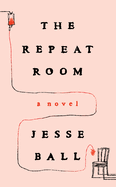
Novelist and poet Jesse Ball's The Repeat Room is a Kafkaesque descent into a legal system based on an experimental program that allows one juror to have an immersive experience of the defendant's life. Abel, a low-class worker in a near-future society with a strict caste system, has been selected to be the juror to experience the life of a man charged with murder. As he is shuffled through a cold, bureaucratic selection process, he also shares a few glimpses into his own alienated life.
Once in the repeat room, however, he is plunged into the suffocating abuse his defendant suffered, and the obsessive sexual relationship that resulted. While Abel was told that the decision would be simple once he spent time in the repeat room, the reader is left to endure the defendant's twisted and horrifying life alongside Abel, only to wonder what kind of "judgment" could possibly come from such a mess and its shocking conclusion.
In the first half of Ball's mesmerizing novel, Abel's journey is a labyrinthine yet precise one, carried out with bewildering and often darkly funny exactitude. Ball perfectly captures this uneasy balance with his arresting and yet slightly off-kilter prose. The novel's second half takes up the same ideas in a startlingly different fashion, sweeping readers up in a dizzying internal monologue that is as horrifyingly inescapable as it is propulsive. It becomes hard to distinguish between the horrors of one man's family and the sins of a larger society. But it also becomes blindingly clear that no one is innocent in a system where a man like this can be found guilty. --Alice Martin, freelance writer and editor

